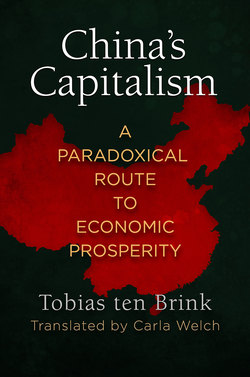China's Capitalism

Реклама. ООО «ЛитРес», ИНН: 7719571260.
Оглавление
Tobias ten Brink. China's Capitalism
Отрывок из книги
China’s Capitalism
A Paradoxical Route to Economic Prosperity
.....
State power can be analyzed as the product of processes mediated by both institutions and discourse within shifting societal power constellations. The objective is therefore to disaggregate the state and examine the characteristics of local government apparatuses, for instance. At the same time, the reliance of the modern “tax state” on material income results in a link between political and economic institutions. Various approaches fail to take sufficient account of the close link between the state and the economy in capitalist-driven societies, and this applies not only to the case of China. State institutions may be based on reproduction criteria that differ from those of modern companies. The latter have to assert their financial strength and hence profitability, while the state has to assert its dominance toward the populace and other countries. Generally speaking, however, the state and the economy form a nexus characterized by structural interdependencies. The paradigm of structural interdependencies “insists … that state action always plays a major role in constituting economies, so that it is not useful to posit states as lying outside of the economic activity” (Block 1994, 696).13 Often seen as an “external” force, the government must therefore be viewed as a fundamental component of capitalist systems—despite the fact that state institutions have been able to achieve greater independence in the past than these hypotheses would initially lead us to believe.14 The overlapping areas of responsibility of the state and its sedimented institutional properties form distinct political systems—such as liberal democracy or, in the case of China, the party-state. In a capitalist system, the state does not necessarily have to follow representative democratic principles.
(7) The contradictory development dynamics of capitalist-driven societies should also be seen as the result of the struggle between market forces or processes of commodification and the desire for social security as well as legal, political, and social recognition that continually arises in the social lifeworlds of the subordinated. According to Polanyi, capitalist dynamics as anonymously linked trade systems (“satanic mills”) destroy permanent social connections and constitute a fundamental contradiction between capitalist development and the requirements for an intact lifeworld (Polanyi 2001). Should the market—in an expanded sense the production relationships—encroach on the foundations of social reproduction, this would inevitably trigger the mobilization of social forces of self-protection, either covert or open. In the capitalist-driven modern era, this self-protection is characteristically expressed as social and political struggles within (and about the politics of) the state and in attempts to institutionalize class conflict (Wright 1997).
.....